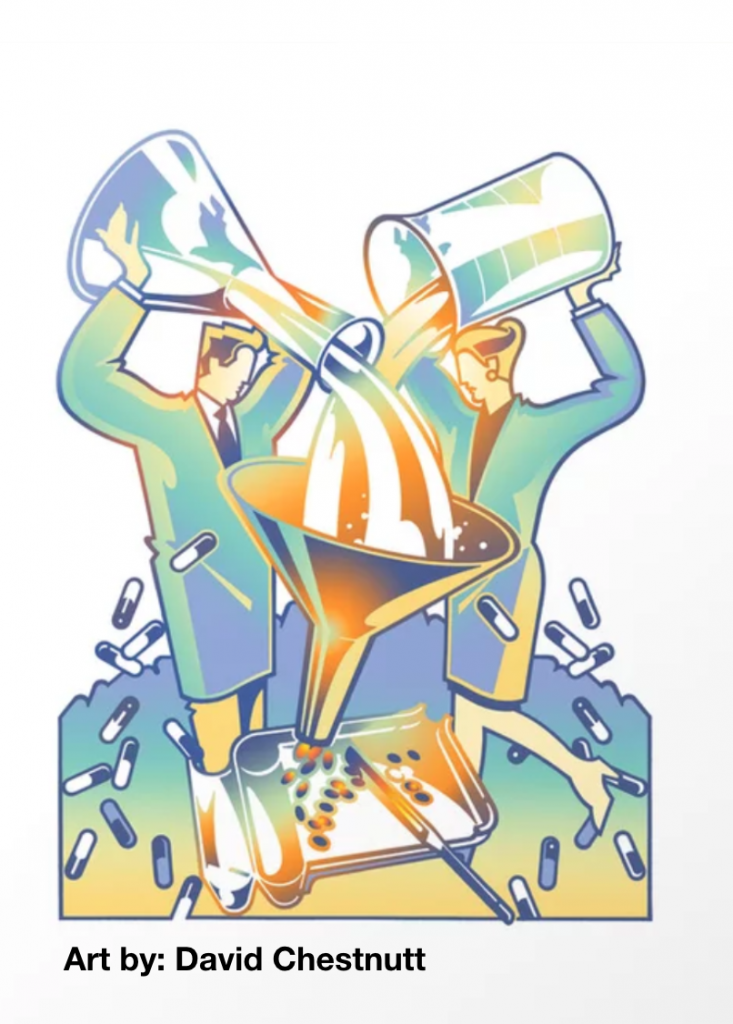Series: What do health care professionals have to say? *Craig, the Pharmacist*

Take a look around you, and you’ll find most people have some level of mistrust in something or someone. We all have the natural curiosity to seek answers, but sometimes we let fear take over and cloud our judgment.
When I talk with vaccine-hesitant parents, one thing that comes up often is mistrust in the pharmaceutical industry.
So, I sat down with a top-dog pharmacist to learn how to help remedy the concerns people have when it comes to “Big Pharma” and vaccinations.
Craig, Director of Pharmacy for a large metro hospital, has been a pharmacist for 40 years. Currently, he is the Director of Pharmacy in a large metro hospital in the northern United States. Craig has seen and heard it all, especially when it comes to trust in the pharmaceutical industry.
Trust issues when it comes to pharmaceuticals aren’t a new thing.
People have been questioning the intentions of the industry for decades. Recently, people have become more vocal in their concerns with Big Pharma, and in conversing with Craig, I’ve learned that the opioid epidemic contributes to this mistrust of healthcare.
Doctors urged to prescribe opioids for pain relief became the norm in the not-so-distant past, and due to the addictive nature of these drugs, people’s lives were altered and destroyed. It’s not surprising many weren’t happy over that, and naturally questioned the intentions of the pharmaceutical industry and healthcare providers in general.
Social media ran with the conspiracy theories that pharmaceutical companies were up to no good and looking to make a buck, and because these companies produce vaccines, they have taken the same bad rap. Consumers forwarding inaccurate information contributes to the propagation of incorrect information. Nothing spreads faster than fear-based or emotionally-charged information
Do we need to be concerned about the industry? Is “Big Pharma” out to get rich at all costs?
A pharmaceutical company is a for-profit business with an interest in generating profits for shareholders. At the same time, Pharma is highly regulated and they have little incentive to promote and sell products that will cause patient harm. Most of these companies are in business for the long term, so safety and credibility are critical for success.
They’re into risk-management. Like all companies, they want to minimize their risk while maximizing their profit.
Craig
While opioids are a huge money-maker, vaccines are quite the opposite.
The revenue generated from vaccines in the big scheme of things is approximately 2% of their total revenue. New pharmaceuticals generate significantly more revenue and profit than vaccines, so there’s not a market-driven reason for them to push vaccines. In fact, the government is subsidizing quite a bit so that Pharma will produce more vaccines.
Craig
Vaccines aren’t that profitable for pharmaceutical companies, but they keep producing them because they are effective and essential products. They also have a high safety record, well-tracked by the pharmaceutical industry and the Food and Drug Administration (FDA).
After a medication is developed and approved for distribution, its production and effects are continually inspected and evaluated by the Food and Drug Administration (FDA) for adverse effects and safety. The FDA has no incentive to hide or diminish any information they receive concerning the safety or effectiveness of the products produced by Pharma.
Craig
Although you may not believe so, pharmaceutical companies and the FDA are transparent.
From a business standpoint, there’s no reason not to disclose things. There’s more of an incentive for full disclosure because in covering something up, the liability could be huge and the negative press related to such activity could be devastating to the company and the FDA. The credibility for all is at stake and nobody wants to put their reputation at risk. They wouldn’t do that.
It’s not in a pharmaceutical company’s best interest to distribute a product that makes the patient (customer) sick. Vaccines have been around for decades. Adverse and unforeseen events are tracked and trended, and if they saw a problem, they would be analyzing the data to determine a cause in order to prevent patient harm.
Craig
The bottom line?
“Big Pharma” isn’t the enemy. They’re publicly-traded companies with products that work—vaccines.
I have my own grandkids vaccinated because I know the benefits far outweigh the risks. Vaccines save lives and prevent preventable diseases and consequences that adversely affect people’s lives.
Craig
*Disclaimer: I, The Vaccine Mom, don’t work for a pharmaceutical company, nor am I being paid to write this
READ MORE IN THIS SERIES:


